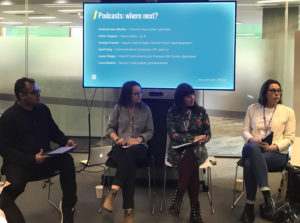In recent years podcast popularity has exploded, and the medium has become a global phenomenon. There are now over 7.1 million podcasts and listener numbers are rapidly growing, one in eight people in the UK listen to podcasts weekly and the trend is increasing globally. But why are podcasts so popular? What opportunities are there for International Development and International Non-Government Organisations (INGOs) to get involved, and why should they? Following the success of IDS’ monthly podcast, Between the Lines, the International Broadcasting Trust (IBT), interviewed its producer Sarah King, for a report entitled ‘Podcasts: Where Next?’.

The report, aimed at international development organisations, was launched at an event in London chaired by Channel 4’s Krishnan Guru-Murthy. The event brought together experts from the BBC, Channel 4, podcast production company Chalk and Blade and the Institute of Development Studies (IDS), to talk about podcasts and opportunities they pose for organisations working in development.
What makes a good podcast?
Podcast listeners are ‘hyper-engaged’, on average 70 percent of people listen through to the end of an episode. Sarah King said that the Between the Lines podcast listeners average 75 percent, and she highlighted that this provides an opportunity to delve deeper into topics and explore complex ideas. Jason Phipps, Head of Commissioning for Podcasts, BBC Sounds, explained that the high level of engagement is because of how people are listening, predominantly through headphones. He said, “you’re literally in the listener’s head”, so it is important to consider the speakers’ voice and tone of conversation.
Georgia Graham, Deputy Head of Digital, Channel 4 news shared some of the experiences they have had producing podcasts such as ‘Ways to Change the World, a one on one interview format, hosted by Krishnan Guru-Murthy and the successes they have had from it, generating headlines and social media traffic from varied and interesting guests who have been willing to be open with them.
Everyone on the panel agreed that the most successful podcasts understand who their audiences are. Sarah King said that she chose books as a central idea to anchor the Between the Lines series around. She thought that would be of interest to IDS audiences, but it also provides an opportunity to reach new audiences by exploring topics on global issues, through engaging and accessible debates and conversations.
Opportunities for global stories
Laura Sheeter, Director of Chalk and Blade, who produces the UNHCR podcast Awake at Night which interviews humanitarian workers on the front line how they cope with the horrors of war, highlighted the importance of storytelling that is emotive and engaging. The Awake at Night podcast is a good example of how INGOs and similar organisations can connect with their audiences through stories and lived experiences.
Sarah King said that podcasting, compared to video content, is less intrusive for the guests, so it allows for more open and inhibited dialogue. The format opens up the space for organisations working across the world, to directly amplify the voices of the people they work with.
Top tips for launching a new podcast
- Think of an idea to focus your series around that is broad enough to sustain over time.
- Understand who your audience is and always have them in mind when planning episodes.
- Be consistent with the format and publishing frequency.
- Encourage guests to jot down some notes and key messages in advance of recording but discourage rigid planning as that can hinder organic conversation.
- If you are not planning a current affairs podcast, record a few episodes in advance of launching, so you have flexibility in planning.
- Link up with other similar podcasts to cross-promote.
- Use a podcast to do something that you can’t already do on your existing channels.
Listen and subscribe to the Between the Lines podcast
We would love to hear from you, if you have any questions, feedback or ideas for future episodes, get in contact via email or on Twitter with the hashtag #IDSbetweenthelines